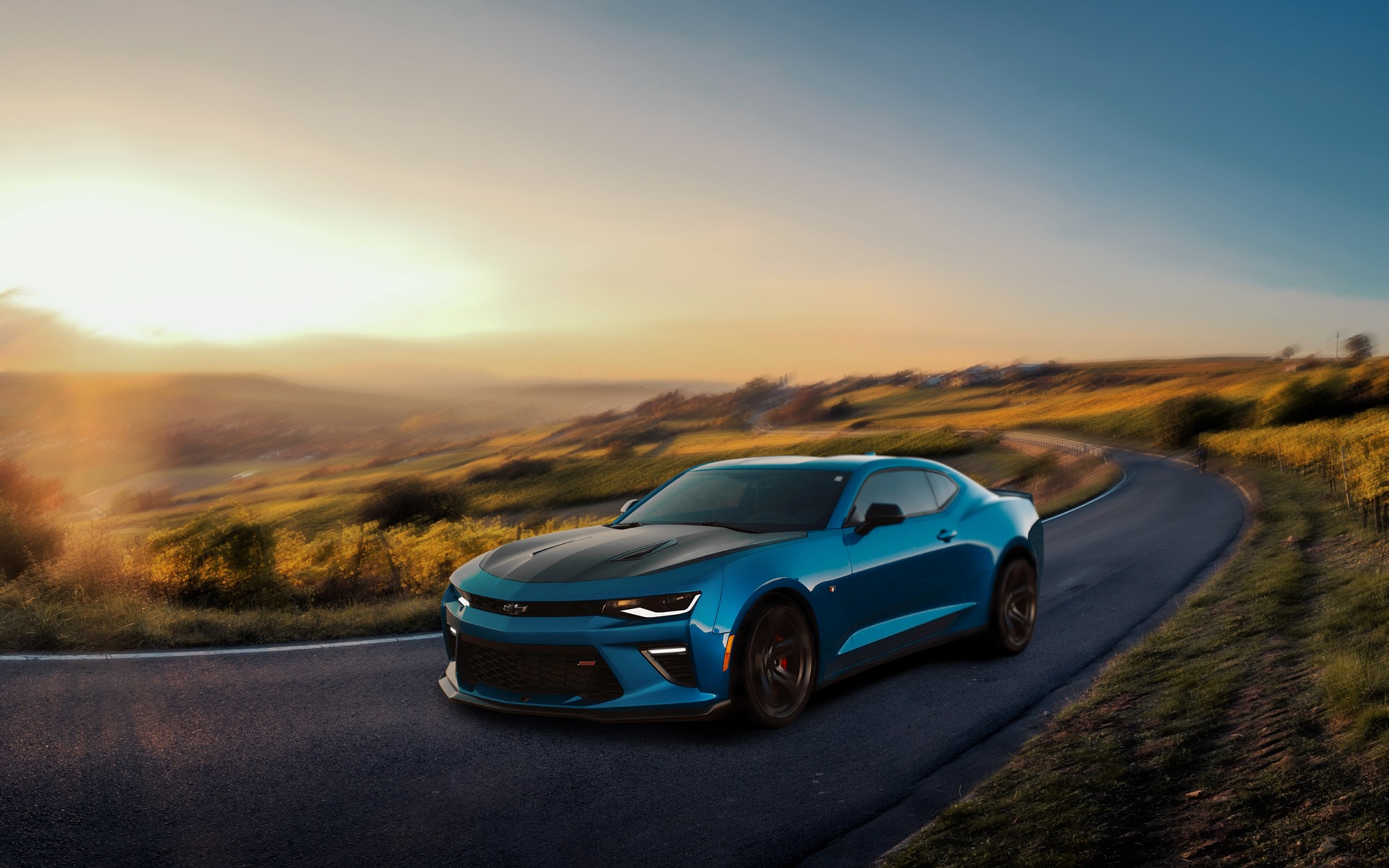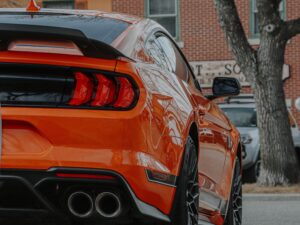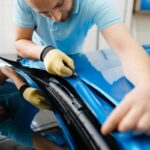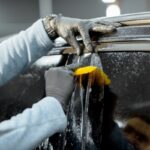How Much Does It Cost to Wrap a Camaro?
Are you looking to give your Camaro a fresh, new look without having to paint it? One popular way to do this is by wrapping your car with a vinyl wrap. Vinyl wraps come in a variety of colors and finishes, and they can protect your car’s paint from scratches and UV rays.

But how much does it cost to wrap a Camaro? The answer to this question depends on several factors, such as the size of your Camaro, the type of vinyl wrap you choose, and the complexity of the installation process.
On average, the cost of vinyl wrap will be around $3000-$5000 per vehicle. However, the actual price can vary massively on either side of this range.
In this blog post, we’ll explore these factors in detail to give you a better understanding of the cost of wrapping a Camaro.
Blazer, Bolt EV, Camaro, Colorado, Corvette, Equinox, Express Cargo Van, Express Passenger Van, Impala, Malibu, Silverado 1500, Silverado 2500HD, Silverado 3500HD, Sonic, Spark, Suburban, Tahoe, Trailblazer, Traverse, and Trax.
Wrapping a Luxury Car May Cost More Than a Regular Vehicle
When it comes to vinyl wrapping a luxury car, the cost can exceed that of wrapping a regular vehicle due to various factors. Luxury cars tend to have intricate designs, unique shapes, and custom features that necessitate more skill, time, and materials to wrap accurately.
Moreover, luxury car owners often have higher expectations for the quality of the wrap, such as the finish, color accuracy, and durability, which can contribute to the cost. Additionally, luxury car owners may prioritize maintaining the value and originality of their vehicles, necessitating extra care and attention to detail during the wrapping process.
Despite the higher cost, vinyl wrapping a luxury car can provide a more luxurious, eye-catching, and unique appearance, elevating the car’s value and appeal.
How Does The Size And Shape Of My Vehicle Affect The Price Of Wrapping It?
As a former car wrapper, I know that the size and shape of your Camaro can have a significant impact on the cost of wrapping it.
Generally, larger vehicles like SUVs, trucks, and vans require more vinyl material and installation time than smaller cars, which can drive up the price. Similarly, vehicles with complex curves, contours, or body features such as spoilers or air intakes require more precise and intricate installation, which can also increase the price.
When I used to work as a car wrapper, I’ve seen some challenging projects, but it’s always a thrill to see the finished result, especially when it comes to cars with unique shapes and sizes.
However, I also know that these challenges can also come with a higher price tag. That’s why it’s essential to get a custom quote based on your specific vehicle and design needs to get an accurate estimate of the cost.
DIY vs Hiring A Professional Car Wrapper
Although DIY car wrapping may seem appealing, it may not always be the optimal choice. Despite the abundance of DIY kits and tutorials available online, car wrapping is a complicated and precise process that demands specialized tools, expertise, and experience.
I have witnessed several DIY attempts go awry, resulting in poorly aligned seams, air bubbles, and even damage to the original paint job. Such errors not only compromise the car’s appearance but also incur significant expenses to fix. That’s why I always suggest engaging a professional car wrapper who possesses the necessary knowledge and equipment to guarantee a seamless and long-lasting finish.
In addition to saving time and energy, entrusting your car to a professional offers you peace of mind. Professional car wrapping comes with warranties and guarantees that cover any defects or problems that may arise. Ultimately, while DIY may be cheaper initially, it may end up costing you more in the long run, both in terms of time and money.
What Material Is Used For Car Wraps?
Vinyl is a durable, flexible, and versatile material that can conform to the shape of your car and withstand various weather conditions. Vinyl also comes in a wide range of colors, finishes, and textures, allowing you to create a unique and customized look for your vehicle.
From my experience, I’ve seen vinyl materials with various designs and textures such as matte, gloss, satin, chrome, carbon fiber, and even 3D effects.
However, not all vinyl materials are created equal. Higher quality vinyl is more expensive but also lasts longer and provides better durability and protection.
That’s why it’s essential to work with a reputable car wrap installer who can recommend and use high-quality vinyl materials that suit your needs and budget.
How The Color and Finish of the Vinyl Wrap Affect The Final Cost
The cost of a vinyl wrap for your Camaro is also affected by the color and finish you choose. Generally, solid colors and standard finishes such as gloss or matte are more affordable than custom colors or specialty finishes like metallic, chrome, or textured wraps.
The reason for this is that the production process for custom colors and finishes is more complex and requires more resources and time to manufacture. Moreover, the quality of the vinyl material used for the wrap also affects the cost. Higher-quality vinyl is generally more durable and has a better finish, but it comes at a higher cost.
Additionally, the size and complexity of your vehicle also influence the price, as more extensive and more intricate wraps require more vinyl material and labor. Ultimately, the color and finish of the vinyl wrap play a significant role in the overall cost, so it’s important to choose the right color and finish that fits your budget and preferences.
How Long Does It Take To Wrap A Car?
Having worked in the car wrapping industry, I can confirm that the time required to apply a car wrap can vary, depending on several factors. The size and intricacy of the vehicle and the installer’s level of expertise are among these factors.
Based on my experience wrapping cars, I have observed that smaller vehicles, such as sedans, typically take one to two days to complete, while larger vehicles, such as vans and trucks, may require three to four days or more. The process entails several stages, including surface preparation, vinyl material cutting and shaping, and material application and smoothing onto the vehicle’s surface.
A professional installer would allocate sufficient time to ensure precise alignment, elimination of air bubbles and wrinkles, and secure adhesion to the car’s body. Hurrying the process can result in errors and flaws that may impact the quality and durability of the wrap. Although the process may take several days, the end result is worth the wait.
How Long Do Car Wraps Last?
The lifespan of a car wrap depends on several factors, such as the quality of the vinyl material, the type of adhesive used, and the environmental conditions that the vehicle is exposed to.
Generally, high-quality vinyl wraps that are installed properly and maintained well can last anywhere from three to five years or even longer. However, harsh weather conditions, frequent exposure to UV rays, and poor maintenance can shorten the life of the wrap.
If you live in a region with extreme weather, such as extreme heat, humidity, or snow, you may need to replace your wrap sooner than expected. Similarly, neglecting to wash and wax your car wrap regularly can lead to dirt buildup, fading, and peeling, which can affect its appearance and durability.
It’s essential to follow the manufacturer’s guidelines for care and maintenance and to work with a professional installer who uses high-quality materials and has experience with car wrapping to ensure that your wrap lasts as long as possible.
How Can I Remove My Car Wrap Safely?
If you’re looking to remove your car wrap, it’s essential to do so carefully to avoid damaging your vehicle’s paint or body.
Start by heating the vinyl material with a heat gun or a hair dryer to soften the adhesive and make it easier to remove. Be sure to use a low heat setting and keep the heat gun or hair dryer moving to avoid overheating the vinyl or the paint. Once the material is heated, use a plastic scraper or squeegee to gently lift the edge of the vinyl and peel it back slowly and steadily.
Avoid using sharp objects or abrasive materials that can scratch or damage your car’s surface. If you encounter any stubborn spots or adhesive residue, use a vinyl wrap remover or a gentle solvent, such as rubbing alcohol or citrus-based cleaners, to dissolve the adhesive without harming the paint.
After removing the wrap, wash your car thoroughly with soap and water to remove any remaining residue and to restore the shine to your car’s finish. If you’re not comfortable removing the wrap yourself, it’s best to work with a professional installer who can remove the wrap safely and efficiently.
Does Wrapping A Car Affect The Warranty?
Many car owners wonder whether wrapping their vehicle will void the manufacturer’s warranty.
The answer is, it depends.
If you have a new car that is still covered by the manufacturer’s warranty, wrapping it may not necessarily void the warranty, but it’s essential to check with your dealer first. Some manufacturers may have specific guidelines or restrictions regarding modifications or aftermarket products that can affect the warranty coverage.
Additionally, if the wrapping process damages the car’s paint or body, it could potentially affect the warranty. That’s why it’s crucial to work with a professional car wrapping company that has experience with your vehicle make and model and uses high-quality materials and techniques.
Be sure to ask for a warranty or guarantee on the workmanship and materials used in the wrapping process. If you have an older car or a vehicle that is no longer covered by the manufacturer’s warranty, wrapping it can be an excellent way to protect the paint, give it a fresh look, and enhance its resale value.
Final Thoughts
In conclusion, the cost of car wrapping can fluctuate depending on various factors, such as the vehicle’s size and shape, material type, design intricacy, and the installer’s experience and expertise.
Conducting thorough research, obtaining quotes from multiple installers, and meticulously comparing their prices and services is crucial before making a decision. Although car wrapping can be a substantial investment, it can also be a cost-effective alternative to repainting while safeguarding your car’s paint and finish from elements, scratches, and fading.
Furthermore, a skillfully executed car wrap can grab attention, distinguish your vehicle, and showcase your personality or business branding.









